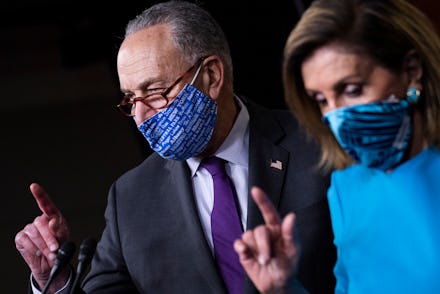It looks like the second coronavirus relief package may never come

If you're a public official and your salary is paid with taxpayer money, your job description is simple: to serve the people. It's not to serve only the people who voted for you, or only those who belong to your political party. It's to serve every constituent. Yet somehow, at the 10-month mark of the onset of coronavirus, leaders on Capitol Hill are still squabbling about a second coronavirus relief package. As the country passes 250,000 people killed by the virus, it doesn't appear that legislators are willing to sacrifice anything — their egos, their salaries, or the perceived upper hand — in order to stop that number from reaching even more shocking heights.
On the surface, the issue at hand is how exactly to spend money in a potential second deal. The first relief bill, the CARES Act, passed in late March; a second proposal, the HEROES Act, was passed by House Democrats in May but was never brought to a vote in the Senate. Now, as the months have worn on and the rent and bills have piled up, it's pretty clear that no relief package will substantively address all needs. At this point, anything is better than nothing — though officials don't seem to think of it that way.
It's not so surprising that Democratic leaders like House Speaker Nancy Pelosi and Senate Minority Leader Chuck Schumer haven't been able to draw out a compromise from those across the aisle. The two sent a letter to Senate Majority Leader Mitch McConnell earlier this week imploring him to pass relief legislation. "We write to request that you join us at the negotiating table this week so that we can work towards a bipartisan, bicameral COVID-19 relief agreement to crush the virus and save American lives," Schumer and Pelosi wrote.
If Election Day showed us anything, it's that Democrats have an uncanny ability to be ineffective while claiming a semblance of moral superiority. Who could blame Senate Republicans for taking one look at the letter Pelosi and Schumer sent to the majority leader and realizing that they have the upper hand in negotiations? (Actually, we all can, and should.) McConnell, who easily won re-election earlier this month, hails from a state currently battling an out-of-control coronavirus spike and that consistently has one of the worst poverty rates in the country. In other words, if the needs of his Kentucky constituent won't spur the most powerful man in Congress to kick-start negotiations, nothing will.
As is unfortunately common in Washington, D.C., the needs of Americans are being drowned out by the drama of politics. Schumer blamed Republicans for the nonsense this week, citing their fear of President Trump, who hasn't been to a coronavirus task force meeting in months. "Senate Republicans are distracted by an angry, petulant president," Schumer said.
The negotiation stalemate comes just a couple weeks out from the Dec. 11 deadline to fund the government. White House Chief of Staff Mark Meadows told reporters that it's a "high priority" to avoid a government shutdown. Of course, that would be extra catastrophic in a year marked by unemployment and economic turmoil, given the federal government has about 2 million people on its payroll.